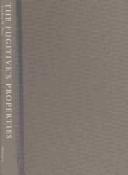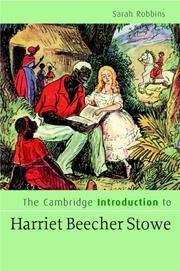| Listing 1 - 10 of 27 | << page >> |
Sort by
|
Book
Year: 2005 Publisher: Project Gutenberg
Abstract | Keywords | Export | Availability | Bookmark
 Loading...
Loading...Choose an application
- Reference Manager
- EndNote
- RefWorks (Direct export to RefWorks)
Book
Year: 2010 Publisher: To be supplied : Project Gutenberg,
Abstract | Keywords | Export | Availability | Bookmark
 Loading...
Loading...Choose an application
- Reference Manager
- EndNote
- RefWorks (Direct export to RefWorks)
Authors --- American --- 19th century --- Biography --- Stowe --- Harriet Beecher --- 1811-1896
Book
Year: 2017 Publisher: Project Gutenberg
Abstract | Keywords | Export | Availability | Bookmark
 Loading...
Loading...Choose an application
- Reference Manager
- EndNote
- RefWorks (Direct export to RefWorks)
Stowe --- Harriet Beecher --- 1811-1896. Uncle Tom's cabin --- Sources
Book
ISBN: 1625344465 Year: 2019 Publisher: Amherst : University of Massachusetts Press,
Abstract | Keywords | Export | Availability | Bookmark
 Loading...
Loading...Choose an application
- Reference Manager
- EndNote
- RefWorks (Direct export to RefWorks)
"How does political change take hold? In the 1850s, politicians and abolitionists despaired, complaining that the 'North, the poor timid, mercenary, driveling North' offered no forceful opposition to the power of the slaveholding South. And yet, as John L. Brooke proves, the North did change. Inspired by brave fugitives who escaped slavery and the cultural craze that was Uncle Tom's Cabin, the North rose up to battle slavery, ultimately waging the bloody Civil War. While Lincoln's alleged quip about the little woman who started the big war has been oft-repeated, scholars have not fully explained the dynamics between politics and culture in the decades leading up to 1861. Rather than simply viewing the events of the 1850s through the lens of party politics, 'There Is a North' is the first book to explore how cultural action -- including minstrelsy, theater, and popular literature -- transformed public opinion and political structures. Taking the North's rallying cry as his title, Brooke shows how the course of history was forever changed"--
Antislavery movements --- Politics and culture --- Popular culture --- History --- Public opinion. --- Stowe, Harriet Beecher, --- Influence. --- United States --- Politics and government --- Causes.
Book
ISBN: 0674054679 9780674054677 9780674034075 0674034074 Year: 2009 Publisher: Cambridge, Massachusetts
Abstract | Keywords | Export | Availability | Bookmark
 Loading...
Loading...Choose an application
- Reference Manager
- EndNote
- RefWorks (Direct export to RefWorks)
Easily the most controversial antislavery novel written in antebellum America, and one of the best-selling books of the nineteenth century, Uncle Tom's Cabin is often credited with intensifying the sectional conflict that led to the Civil War. In his introduction, David Bromwich places Harriet Beecher Stowe's novel in its Victorian contexts and reminds us why it is an enduring work of literary and moral imagination.
Master and servant --- Fugitive slaves --- Plantation life --- Slavery --- Slaves --- Stowe, Harriet Beecher, --- Uncle Tom --- Tom, --- Southern States --- Uncle Tom (Fictitious character) --- Enslaved persons --- Persons
Book
ISBN: 1613760043 9781613760048 9781558498945 155849894X 9781558498938 1558498931 Year: 2011 Publisher: Amherst University of Massachusetts Press
Abstract | Keywords | Export | Availability | Bookmark
 Loading...
Loading...Choose an application
- Reference Manager
- EndNote
- RefWorks (Direct export to RefWorks)
Books and reading --- Literature and society --- African Americans in literature. --- Afro-Americans in literature --- Negroes in literature --- History --- Stowe, Harriet Beecher,
Book
Year: 2008 Publisher: Project Gutenberg
Abstract | Keywords | Export | Availability | Bookmark
 Loading...
Loading...Choose an application
- Reference Manager
- EndNote
- RefWorks (Direct export to RefWorks)
Dix --- Dorothea Lynde --- 1802-1887 --- Fuller --- Margaret --- 1810-1850 --- Child --- Lydia Maria Francis --- 1802-1880 --- Stowe --- Harriet Beecher --- 1811-1896 --- Alcott --- Louisa May --- 1832-1888 --- Sedgwick --- Catharine Maria --- 1789-1867 --- Ware --- Mary L. (Mary Lovell) --- 1798-1849

ISBN: 1282584693 9786612584695 0226241114 9780226241111 9780226044330 0226044335 0226044335 0226044343 9780226044347 Year: 2004 Publisher: Chicago University of Chicago Press
Abstract | Keywords | Export | Availability | Bookmark
 Loading...
Loading...Choose an application
- Reference Manager
- EndNote
- RefWorks (Direct export to RefWorks)
In this study of literature and law before and since the Civil War, Stephen M. Best shows how American conceptions of slavery, property, and the idea of the fugitive were profoundly interconnected. The Fugitive's Properties uncovers a poetics of intangible, personified property emerging out of antebellum laws, circulating through key nineteenth-century works of literature, and informing cultural forms such as blackface minstrelsy and early race films. Best also argues that legal principles dealing with fugitives and indebted persons provided a sophisticated precursor to intellectual property law as it dealt with rights in appearance, expression, and other abstract aspects of personhood. In this conception of property as fleeting, indeed fugitive, American law preserved for much of the rest of the century slavery's most pressing legal imperative: the production of personhood as a market commodity. By revealing the paradoxes of this relationship between fugitive slave law and intellectual property law, Best helps us to understand how race achieved much of its force in the American cultural imagination. A work of ambitious scope and compelling cross-connections, The Fugitive's Properties sets new agendas for scholars of American literature and legal culture.
American literature --- Slavery in literature. --- Fugitive slaves --- Law and literature --- African Americans in literature. --- Fugitive slaves in literature. --- Property in literature. --- Race in literature. --- Afro-Americans in literature --- Negroes in literature --- Literature and law --- Literature --- Slavery and slaves in literature --- Slaves in literature --- History and criticism. --- Legal status, laws, etc. --- History --- Stowe, Harriet Beecher, --- Enslaved persons in literature --- literature, law, slavery, fugitive, property, antebellum, blackface, minstrelsy, race films, appearance, expression, personhood, commodity, commodification, patents, uncle toms cabin, harriet beecher stowe, theft, gift, copyright, nonfiction, possession, chattel, labor, power, agency, wealth, economics, gender, masculinity, femininity.
Book
ISBN: 1503606090 9781503606098 9780804799157 0804799156 Year: 2018 Publisher: Stanford, California
Abstract | Keywords | Export | Availability | Bookmark
 Loading...
Loading...Choose an application
- Reference Manager
- EndNote
- RefWorks (Direct export to RefWorks)
Uncle Tom charts the dramatic cultural transformation of perhaps the most controversial literary character in American history. From his origins as the heroic, Christ-like protagonist of Harriet Beecher Stowe's anti-slavery novel, the best-selling book of the nineteenth century after the Bible, Uncle Tom has become a widely recognized epithet for a black person deemed so subservient to whites that he betrays his race. Readers have long noted that Stowe's character is not the traitorous sycophant that his name connotes today. Adena Spingarn traces his evolution in the American imagination, offering the first comprehensive account of a figure central to American conversations about race and racial representation from 1852 to the present. We learn of the radical political potential of the novel's many theatrical spinoffs even in the Jim Crow era, Uncle Tom's breezy disavowal by prominent voices of the Harlem Renaissance, and a developing critique of "Uncle Tom roles" in Hollywood. Within the stubborn American binary of black and white, citizens have used this rhetorical figure to debate the boundaries of racial difference and the legacy of slavery. Through Uncle Tom, black Americans have disputed various strategies for racial progress and defined the most desirable and harmful images of black personhood in literature and popular culture.
Racism --- American literature --- Stereotypes (Social psychology) in literature --- African Americans in literature --- Afro-Americans in literature --- Negroes in literature --- Stereotype (Psychology) in literature --- English literature --- Agrarians (Group of writers) --- History. --- Social aspects --- Stowe, Harriet Beecher, --- Uncle Tom --- Tom, --- Beecher Stowe, Harriet --- Beecher Stowe, Henriette --- Beecher Stowe, H. --- Stowe, Harriet Beecher --- Stowe, Harriet Elizabeth --- Bicher-Stou, Khenriet --- Stowe, H. B. --- Stou, Khenriet Bicher --- -Stowe, Enriqueta B. --- Stowe, Harriet Elizabeth Beecher --- Beecher, Harriet Elizabeth --- Bicher-Stou, G. --- Bicher-Stou, Garriet --- Stou, Garriet Bicher --- -Bicher-Stou, Ḣarrii̐et --- Bicher-Stou, Ḣ. --- Stou, Ḣarrii̐et Bicher --- -Beecher-Stowe, Harriet --- Ssu-tʻu-huo --- Beecher-Stowe, H. --- Stowe, H. Beecher --- -Bētser-Stoou --- Crowfield, Christopher --- Beecher, H. --- Sṭav, Hēriyaṭ Pīccar --- Sṭo, Haryeṭ Bits'er --- Bits'er Sṭo, Haryeṭ --- ביטשער סאאו --- ביטשער־סטאו --- סטאו, הערריעט ביטשער --- סטאו, הערריעט ביטשער, --- סטו, ביצ׳ר, --- ハリエットビーチャーストウ, --- Adaptations --- History and criticism. --- United States --- Race relations --- History --- Social aspects&delete&

ISBN: 0521671531 9780521671538 0521855446 9780521855440 9780511611018 9780511275357 0511275358 0511271476 9780511271472 0511273096 9780511273094 0511274653 9780511274657 0511611013 1107166063 9781107166066 1280815566 9781280815560 0511568541 9780511568541 0511273886 9780511273889 Year: 2007 Publisher: Cambridge Cambridge University Press
Abstract | Keywords | Export | Availability | Bookmark
 Loading...
Loading...Choose an application
- Reference Manager
- EndNote
- RefWorks (Direct export to RefWorks)
Through the publication of her bestseller Uncle Tom's Cabin, Harriet Beecher Stowe became one of the most internationally famous and important authors in nineteenth-century America. Today, her reputation is more complex, and Uncle Tom's Cabin has been debated and analysed in many different ways. This book provides a summary of Stowe's life and her long career as a professional author, as well as an overview of her writings in several different genres. Synthesizing scholarship from a range of perspectives, the book positions Stowe's work within the larger framework of nineteenth-century culture and attitudes about race, slavery and the role of women in society. Sarah Robbins also offers reading suggestions for further study. This introduction provides students of Stowe with a richly informed and accessible introduction to this fascinating author.
Beecher-Stowe, Harriet --- Women novelists, American --- American women novelists --- Stowe, Harriet Beecher, --- Beecher Stowe, Harriet --- Beecher Stowe, Henriette --- Beecher Stowe, H. --- Stowe, Harriet Beecher --- Stowe, Harriet Elizabeth --- Bicher-Stou, Khenriet --- Stowe, H. B. --- Stou, Khenriet Bicher --- -Stowe, Enriqueta B. --- Stowe, Harriet Elizabeth Beecher --- Beecher, Harriet Elizabeth --- Bicher-Stou, G. --- Bicher-Stou, Garriet --- Stou, Garriet Bicher --- -Bicher-Stou, Ḣarrii̐et --- Bicher-Stou, Ḣ. --- Stou, Ḣarrii̐et Bicher --- -Beecher-Stowe, Harriet --- Ssu-tʻu-huo --- Beecher-Stowe, H. --- Stowe, H. Beecher --- -Bētser-Stoou --- Crowfield, Christopher --- Beecher, H. --- Sṭav, Hēriyaṭ Pīccar --- Sṭo, Haryeṭ Bits'er --- Bits'er Sṭo, Haryeṭ --- ביטשער סאאו --- ביטשער־סטאו --- סטאו, הערריעט ביטשער --- סטאו, הערריעט ביטשער, --- סטו, ביצ׳ר, --- ハリエットビーチャーストウ, --- Criticism and interpretation. --- Arts and Humanities --- Literature
| Listing 1 - 10 of 27 | << page >> |
Sort by
|

 Search
Search Feedback
Feedback About UniCat
About UniCat  Help
Help News
News